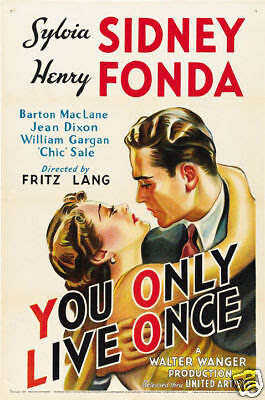No, You Only Live Once is not one-half of a James Bond movie. (Sorry about that!) Instead it’s an early film noir, dating back to 1937, about an ill-fated couple who hit the road after the husband’s violent escape from prison. There’s a long tradition in Hollywood of movies that focus on lovers who share a passion for fast cars and lives of crime. When I was coming into my own as a film enthusiast, the unforgettable flick was Bonnie and Clyde, which used the story of two actual Depression-era bank robbers to celebrate the audacity and the undying love of a doomed pair. Admirers of Bonnie and Clyde tend to think back to films like 1950’s Gun Crazy for a similarly enticing blend of love, sex, and violence.
But earlier “lovers on the lam” movies, like 1948’s They Live By Night, treat crime sprees with less exuberance. Their emphasis is on social wrongs that trap basically good-hearted lovers in nightmarish situations from which violence seems the only escape. I was interested to see this hold true in You Only Live Once, the second Hollywood film of the great Austrian director Fritz Lang., whose early credits included Expressionist masterpieces like Metropolis and M. Top-billed in You Only Live Once is Sylvia Sidney, a long-lived star who would be nominated for an Oscar more than thirty years later, as Best Supporting Actress for Summer Wishes, Winter Dreams. In You Only Live Once, she’s Joan, an efficient, ebullient career gal, working for a local public defender who adores her. To his dismay, she’s head-over-heels about a young convict, who’s just won release after his third prison stint. As played by rising star Henry Fonda, Eddie is an earnest young man who’s survived a rough upbringing. Ashamed of his past misdeeds, he’s determined to marry Joan and embark on a life of sober domestic bliss.
After a joyous homecoming, Eddie’s problems continue to mount. Though he’s been promised a steady job as a truckdriver, his unsympathetic boss finds an easy excuse to fire him. A search for another position turns futile: no one wants to trust a guy with a prison record, no matter how much he’s determined to keep to the straight and narrow. (It’s the Depression, of course, so all jobs are scarce, but the film also seems to condemn a system that offers no constructive support to those who’ve left prison walls behind.)
For Eddie, desperate to support himself and his wife, a return to crime seems to be the only alternative. But when a local bank robbery results in several deaths he swears he had nothing to do with it. No matter: he’s tried and convicted, ending up on Death Row.
While loyal Joan struggles to free him, his execution date nears. A last-minute exoneration by the governor ironically results in more tragedy, including the death of one of Eddie’s most selfless supporters. Soon he and Joan are fleeing into the hinterlands, living as best they can. (Somewhere in there, Joan has a baby, without ever seeming to have been pregnant or in labor: the Thirties was a great decade for sweeping physical reality under the rug.)
You Only Live Once isn’t raw and exciting, like such later lovers-on-the-lam films as Badlands and Thieves Like Us. Instead it’s heart-wrenchingly sad, with the intense Fonda and the vivacious Sidney suggesting to the viewer how human potential is wasted when basically good people are trapped by circumstances beyond their control. All they want is to live and love . . . but you only live once.








No comments:
Post a Comment